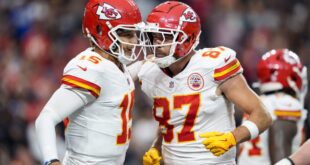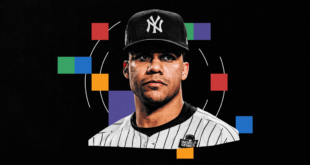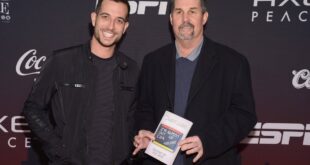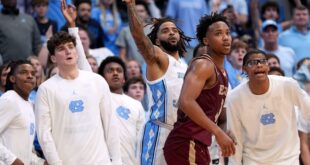We’re just over a month into the NHL regular season, and for some teams, the high hopes and optimism of the preseason have faded away for one reason or another.
The Athletic asked its NHL staff this week for each team’s biggest concern at this point. The responses covered the full spectrum, from goaltending and lack of offense to bad defense, injuries and more. Here’s what they said.
Their offense is still bottom tier: The Ducks have scored only one or two goals in six of their 10 games. They’ve avoided being shut out but their 2.2 goals per game ranks 31st, putting them above only the equally punchless New York Islanders. Several of their top offensive players are struggling. Mason McTavish and Cutter Gauthier have yet to score. Frank Vatrano and Trevor Zegras each have one empty net goal. It hasn’t helped that their power play is just 4-for-31, but they’re also being decisively outshot by an average of nine. The offense would really be inept if Troy Terry, Leo Carlsson and Ryan Strome didn’t have 12 of their 22 goals. Lukas Dostal’s tremendous goaltending is keeping them afloat. — Eric Stephens

GO DEEPER
Duhatschek: ‘Iron Mike’ Keenan speaks, a Ducks’ hypothetical and how Utah will manage injuries
Five-on-five offense: Through 11 games, the Bruins have scored only 16 five-on-five goals. David Pastrnak has just one. Brad Marchand, Charlie Coyle, Pavel Zacha and Morgan Geekie, all of whom started the season in the top six, have zero. It would be one thing if the Bruins had high-end goaltending like they did for the past three seasons. Jeremy Swayman, without Linus Ullmark, is still finding his game. — Fluto Shinzawa

GO DEEPER
Private data shows all kinds of red flags for the 3-3-1 Bruins
Secondary scoring: Heading into Friday night, the Sabres had only two power-play goals this season and had only one goal total from second-liners Dylan Cozens and Jack Quinn. Of Buffalo’s 24 five-on-five goals, 11 have come with Tage Thompson on the ice. Lindy Ruff tried mixing up the second and third lines this week in an effort to get more from players like Cozens and Quinn. The second line and power play are the key to getting more consistent offense. — Matthew Fairburn

GO DEEPER
Can Sabres’ lineup changes help Dylan Cozens, Jack Quinn get back on track?
Are young players still progressing? This should be the No. 1 priority for the Flames. Connor Zary is near the top of the Flames’ leaderboard in points. That’s good. Dustin Wolf has lost his last two starts after winning his first three. That’s less good. The shine of Martin Pospisil as a center has already worn off. That’s also less good, but at least he’s playing with Zary again. Matthew Coronato doesn’t have a regular spot in the lineup. The Flames crashing down to Earth after a hot start was expected. It’s all about the youth continuing to push themselves forward. — Julian McKenzie
Goaltending: The Hurricanes’ goaltending has been good — entering Friday’s games, Carolina had allowed the second-fewest goals in the league at 2.33 per game — but that doesn’t mean there isn’t cause for concern. Frederik Andersen missed Monday’s game in Vancouver, leading to Spencer Martin being recalled. Andersen was later announced to be out week to week with a lower-body injury. Andersen (3-1-0, .941 save percentage, 1.48 goals-against average) had a better GAA and save percentage than Pyotr Kochetkov (4-1-0, .891, 2.61) in October, and the Hurricanes are thin after Martin should another injury occur. The position is surely on the minds of the coaching staff and front office. — Cory Lavalette
Goal scoring: There’s no doubt the Blackhawks are a better team than a season ago, but the offense remains an area of concern. They just don’t have a ton of depth scoring. They could especially use more five-on-five scoring from Tyler Bertuzzi, Taylor Hall, Philipp Kurashev, Ilya Mikheyev and Teuvo Teräväinen. Those five players combined for four goals in five-on-five play through the first 11 games. — Scott Powers
Goaltending: Colorado’s .858 save percentage ranks last in the NHL, and it’s without a doubt the biggest contributor to the disappointing start to the season. The Avalanche haven’t been bad defensively by most metrics, allowing the 10th-fewest expected goals per 60 minutes, but all three goalies have struggled. Alexandar Georgiev’s minus-9.42 GSAx ranks 71st out of the 71 goalies to play this season, more than three goals worse than the next goalie. He should progress back to being near the league average, but it needs to happen quickly before the Avalanche lose too much ground in an incredibly competitive Central Division. — Jesse Granger
Paper-thin depth: The Blue Jackets’ 5-4-1 start is solid enough just at face value. But considering the players they’ve lost to injuries — captain Boone Jenner, Kent Johnson, Dmitri Voronkov and defenseman Erik Gudbranson — they’ve patched lines together and continued to play well. However, they can’t possibly suffer that many injuries and expect to compete. Right? Right? — Aaron Portzline
Wyatt Johnston’s lack of scoring: It’s all relative, right? The Stars don’t have a whole lot to be concerned about. They’re 7-3-0, Jake Oettinger is in top form, Matt Duchene is having a turn-back-the-clock season. But this was supposed to be the year Johnston took that final step into superstardom. Instead, he has one goal and four assists in 10 games, he has some of the worst possession numbers on the team and is on the third line while Logan Stankoven takes over on the top line. The Stars were still outscoring opponents 6-3 at five-on-five (heading into Friday) with Johnston on the ice; it’s hardly a crisis. But if the Stars are going to make another Stanley Cup run this season, Johnston has to be a big part of it. — Mark Lazerus
A lack of offensive zone time: There are a lot of concerns accompanying Detroit’s 4-5-1 start, but this is the one that sums them all up best. Detroit just hasn’t spent enough time in its opponent’s end. According to data from NHL EDGE, the Red Wings have played just 37.3 percent of the time in the offensive zone, the lowest percentage in the league. That stat is likely a symptom of multiple issues, including getting hemmed into their own zone too often and flaws with the team’s forecheck, but it sums up Detroit’s offensive woes accurately. The Red Wings knew they lost a lot of offense this summer and that it would be hard to replace, but they’re not even really giving themselves a chance to do so. — Max Bultman

GO DEEPER
Ten Red Wings thoughts after 10 games: Can Detroit’s early issues be fixed?
Connor McDavid’s injury: The Oilers got off to a good start in their first full game without McDavid, who’s expected out of the lineup for two to three weeks with a lower-body injury. They recorded a season-high five goals in a victory over the Nashville Predators on Thursday. But that’s just one game and it was against Nashville. They always beat Nashville. The Oilers won just once in five tries last season with McDavid sidelined due to injury, and they’ll be in tough until he returns. Even with the Music City result, the Oilers still have just five wins in their first 11 games. A slide this month could cost them the Pacific Division crown they’re coveting. — Daniel Nugent-Bowman

GO DEEPER
Oilers’ McDavid expected to miss 2-3 weeks with injury
The third pair: Everything is going about as well as could be expected for the defending champs, starting with Aleksander Barkov’s return to the lineup, but they’re going to need to figure out how to proceed with their bottom defensive pairing. There are three possible combinations of Adam Boqvist, Nate Schmidt and Uvis Balinskis, and none have been good — Florida has been outscored 10-1 with them on the ice. — Sean Gentille
Quinton Byfield’s slow start: Byfield is without a goal over the first 11 contests. He’s chipped in five assists, but it’s not the kind of beginning he or the Kings imagined after the sides agreed on a five-year extension worth $31.25 million. His advanced metrics aren’t bad, and the Kings haven’t done him any favors by committing to return him to his natural position at center and abandoning that just five games in. It’s possible that he bounces between the middle and the wing, which may not be great for maintaining consistency or chemistry with his linemates. The worry with him offensively is that he’s had a tendency to fall into lengthy scoring droughts. Even in his breakout last season, the 22-year-old went 19 games without a goal before he scored his 20th in the regular-season finale. — Eric Stephens
Jared Spurgeon’s health: One big reason the Wild were confident this season would be better than last was the return of the captain after he was limited to 16 games last season due to shoulder, hip and back injuries. But after season-ending hip and back surgeries, Spurgeon was sidelined after his second game and missed six in a row before returning Tuesday in Pittsburgh. The team has said the discomfort is “part of the healing process.” Spurgeon said they took “different routes” medically to get him back in the lineup, but he couldn’t say he was confident this would not be a season-long issue. The good news is the Wild went 4-1-1 without him. — Michael Russo

GO DEEPER
Wild say captain Jared Spurgeon’s absence related to surgeries but ‘part of the healing process’
A lack of maturity: When you are the second-youngest team in the NHL, with the youngest blue line, a lack of maturity probably should not be a concern. It should be expected. But despite their youth, the Canadiens have elevated internal expectations, and that means recognizing game situations and just how badly things can go wrong when your reads are off. Basic notions like playing a deep game, defensive coverage on faceoffs or defensive zone play in general have been problems at various points already this season. Perhaps it’s a sign this team is not yet mature enough to execute relatively simple concepts, but if the Canadiens hope to be mildly competitive this season, they will need to mature in a hurry. — Arpon Basu

GO DEEPER
Canadiens’ attention to detail not yet up to standard, and Kraken exposed it
Nashville Predators
No. 2 center: Defensive zone coverage deserves a nod, as well. Though the Preds have rebounded well from losing their first five games, they are still forcing Juuse Saros to deal with too many Grade-A chances. But just as Saros, the power play and other aspects of the Preds’ game are progressing, that will, too. There’s no clear answer on No. 2 center, which is part of why Andrew Brunette has done so much shuffling with his top two lines. The answer is likely on another roster right now. — Joe Rexrode
Ondřej Palát’s struggles: The Devils are off to a solid start, and their forward group has been good. Palát, however, is off to a slow start. Entering Friday, he had the worst expected-goals-for percentage among Devils forwards, according to Natural Stat Trick, and was averaging his lowest ice time per game since his rookie season. — Peter Baugh
New York Islanders
Goals: When you get shut out four times in your first 10 games, there can be no other concern that tops this one. The Islanders haven’t been a goal-scoring juggernaut for a long time, but this season’s futility is a new low — and they’ve been shut out by very mediocre teams (Red Wings, Ducks, Blue Jackets) to make it even worse. — Arthur Staple
Mika Zibanejad’s struggles: Zibanejad had seven points in nine games through Thursday, which on the surface is a respectable total. But he was also a minus-3, and coach Peter Laviolette lowered his ice time from past seasons. His underlying numbers have suffered, too. The Rangers had only 41 percent of the expected goals share with him on the ice at five-on-five, according to Natural Stat Trick, and were getting out-chanced with him on the ice. Center play is vital for playoff teams, and the Rangers could use a Zibanejad resurgence. — Peter Baugh
The defense: The Sens defense has had good moments like an 8-1 domination over the St. Louis Blues. But they’ve still allowed three goals or more in the majority of games. The Senators have also adjusted to life without Artem Zub, who normally plays alongside Jake Sanderson, and are making the most of their Jacob Bernard-Docker—Tyler Kleven pair. But if the Sens want to compete, they will still need an extra defender. — Julian McKenzie

GO DEEPER
Six potential defensive trade targets for the Senators
Five-on-five scoring: Through their first 11 games, the Flyers have managed only 16 goals at five-on-five — and five of those came in a single game, a win over Minnesota on Oct. 26. Part of that is because they have looked much too disjointed all over the ice at times and have too often been hemmed in their own zone. But players like Morgan Frost (zero five-on-five goals), Matvei Michkov (zero), Travis Konecny (zero), Owen Tippett (1), Tyson Foerster (1) and Joel Farabee (1) have still had plenty of opportunities to do more damage and haven’t. — Kevin Kurz

GO DEEPER
What we know about the Flyers after 10 games: Some positives, but a lot left to learn
Erik Karlsson’s offensive production: Never an own-zone marvel, Karlsson has consistently created chances at a historic rate for defensemen. That is not the case this season, as his paltry point total reflects an ineffectiveness offensively that is very outside the norm. Karlsson is in Pittsburgh to be a prolific offensive force. But he had only one goal and seven points through 12 games, and he hasn’t driven play the way he has in previous seasons. Perhaps an upper-body injury that kept him from participating in training camp remains an issue, or at least it didn’t afford him the time he needed to get game-ready. Whatever the cause, Karlsson’s poor offensive start is one of the big reasons the Penguins began 3-7-1 and look nowhere close to competing for the playoffs. — Rob Rossi
Will Smith’s early struggles: Eight games. No points. It was weighing on the 19-year-old rookie, who also was scratched from three other contests as part of the team’s load management plan for him over the first half of the season. It looked like the former Boston College star was having trouble with the speed and size of the NHL game as he had minimal impact. Thursday night saw the pressure valve pop. Smith scored his first goal (and his first point) when he beat Chicago goalie Petr Mrázek in the first period and then added another successful wrist shot in the second that would be the winning goal in a 3-2 victory. The big night should be a confidence jolt for the No. 4 pick in the 2023 draft, who is expected to be a big part of San Jose’s future. — Eric Stephens
Make it TWO goals for Will Smith 🔥 pic.twitter.com/bNOm0OpaH8
— B/R Open Ice (@BR_OpenIce) November 1, 2024
Backup goaltending: The Kraken have played well in the first month, but despite some promising signs, they are still chugging along at roughly a .500 point percentage. They’re one of only two Pacific Division teams in the black by goal differential and their underlying profile looks consistent with that of a playoff team, but they’ve been held back by porous depth goaltending performances in October. Philipp Grubauer is sporting an .881 save percentage across his four starts, and the Kraken have won just one of those four games. It’s early yet and the samples are small, but for a team like Seattle, you need to be at least at a .500 point percentage in games your backup goaltender plays if you’re going to be a playoff team. In the first month of the season, Seattle’s depth goaltending prevented it from consolidating a more auspicious start. — Thomas Drance
St. Louis Blues
Robert Thomas’ injury: Thomas suffered a fractured ankle Oct. 22 and will be re-evaluated in late November. Any club that loses its No. 1 center will miss him, but the Blues were already thin at the position. They’ve forced winger Pavel Buchnevich into the role, which hasn’t worked as they hoped. The offense (2.7 goals per game, tied for 24th in the league) and power play (16.7 percent, 21st) are struggling. As a result, the team has played a lot of catch-up hockey, trailing by two goals or more in seven of its 11 games. Thomas can’t get back soon enough. — Jeremy Rutherford
Depth support: Depth was always going to be a weakness in Tampa Bay. Cap casualties have depleted the bottom six and third pair, and management hasn’t found cost-effective options to adequately replace what the Lightning lost. Outside of Nick Paul, the bottom six is pretty much a black hole for offense. While the team’s strategy is built around its elite core, and with Ryan McDonagh back, plus Brandon Hagel and Anthony Cirelli clicking, the supporting cast got a major boost. But the bottom of the lineup seriously lacks. — Shayna Goldman
The power play: On one hand, this is surprising. On the other, it’s not surprising at all. The surprising aspect: The Leafs have had one of the league’s top regular-season power plays for years and still boast all the same familiar parts of it. Strong starts have been the norm for the five-pack of Auston Matthews, Mitch Marner, William Nylander, John Tavares and Morgan Rielly. That same unit, of course, struggled mightily in second halves year after year and, more damagingly, in the postseason. The Leafs, with first-year coach Craig Berube, opted to keep that top group intact to start the season. That’s changed recently, with Berube pivoting to two balanced units. Whether that makes a difference in the long run (if the Leafs even stick with it) is very much TBD. — Jonas Siegel
Where did the offense go? After a terrific 3-0 start where the team piled up goals and brought the Salt Lake City crowd to its feet, it has been a tough go for the Utahns. They have only two wins in their last eight games, a stretch during which they’re 29th in the NHL in goals scored. Even with their two big losses on defense — Sean Durzi and John Marino are both out with long-term injuries — they’ve managed to play OK in their own end, but the power play has been misfiring and top prospect Josh Doan was sent down to Tucson. Utah especially needs more from Logan Cooley, Barrett Hayton and Lawson Crouse, who have combined for just six points during this funk. — James Mirtle
The power play: Vancouver’s core group has high-end skill and it’s consistently combined on the power play to manufacture goals at about a 22 percent clip over the past several seasons — which is very good, but not elite. For whatever reason through the first month of the season, however, the power play is struggling enormously to get set up and generate shot attempts. Though the conversion rate is just below average — buoyed by a two-goal outburst against the Blackhawks in mid-October — Vancouver’s power play isn’t passing the eye test and its underlying footprint is league-worst. The Canucks, for example, are the only team in the NHL generating shot attempts at a rate south of 80 attempts per hour. And they’re in the mid-70s. They’re also generating shots at a league-worst rate. If that continues, the club will need to get lucky or shoot at an incredibly efficient clip to produce at even an average rate with the man advantage. Even if the Canucks have the skill level to pull that off, it’s a very tough way to live. — Thomas Drance
Performance on the road: The difference between how the Golden Knights have performed inside the friendly confines of T-Mobile Arena compared to on the road has been stark. Vegas is a perfect 7-0-0 at home but has yet to win in four contests as the visitor. Part of that could be competition, as all four opponents on the road were playoff teams a year ago. It could also be a result of the lineup not being quite as deep as it once was. Vegas’ top line of Jack Eichel, Mark Stone and Ivan Barbashev has dominated, but on the road, it’s tougher for coach Bruce Cassidy to get favorable matchups. — Jesse Granger
The power play: It feels like picking nits given how good the Caps look overall, but there’s some work to be done with the man advantage. They’re 30th in percentage, which is rough, but it might be as simple as getting a bounce or two because they’re generating chances. As a team, they’re at 9.35 expected goals per 60, ninth in the league. In other words, the process isn’t broken. — Sean Gentille
The Jets are special teams merchants: Last year’s Jets would have loved a power play this good: an NHL-best 45.2 percent behemoth that has looked dangerous from every position on the ice. Kyle Connor is on fire, tied for the power-play goals lead with four, and Cole Perfetti has three from the second unit. The problem is that this year’s Jets are not as good at even strength as last year’s team. The 10-1-0 record deserves plaudits, but Winnipeg has outscored its opponents only 27-20 at five-on-five. Those numbers are top-10 as opposed to best in the league like the Jets were last season. Keep working on that through a grueling November schedule and this team will be a contender. — Murat Ates

GO DEEPER
10 key takeaways from the Jets’ NHL-best 9-1-0 start to 2024-25
(Top photo of Connor McDavid and Erik Karlsson: Curtis Comeau / Icon Sportswire via Getty Images)
 meganwoolsey Home
meganwoolsey Home






